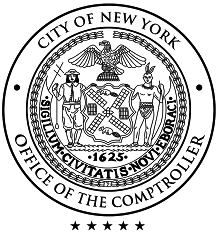
Image credit: New York City Office of the Comptroller
On April 2018, New York City Comptroller Scott M. Stringer issued a report on the impact of Airbnb on City rents. The report looked at how the home-sharing company impacted rent in the City over the period of 2009 to 2016. The report found that rental rates increases during this time period can be attributed to Airbnb.
Between 2011 and 2017, the Comptroller reports the City lost approximately 183,000 affordable units of housing renting for less than $1,000, a number larger than the entire public housing stock. Homelessness is also at a record high of over 60,000 homeless people sleeping in shelters.
Between 2009 and 2016, citywide rents rose 25% on average or $279 per month. Brooklyn saw the highest increase in rent by 35% or $340 per month. Queens followed with 22% increase or $242 per month. The Bronx saw an increase by 21% or $171 per month. Manhattan saw an increase by 19% or $276 per month. Staten Island increased by 14% or $129 per month.
At the same time, Airbnb listings rose from 1,000 in 2010 to over 43,000 by 2015, with a slight decrease in 2016 to 40,00 listings. Manhattan and Brooklyn had 87% of all listings in 2016. Most Manhattan listings are in neighborhoods below 59thStreet while Brooklyn’s Greenpoint, Williamsburg, Bedford-Stuyvesant, and Bushwick had the majority of listings in that borough.
The report found that these neighborhoods in Manhattan and Brooklyn had rent increases in substantially higher rates than the borough average between the 2009 to 2016 time period. For example, Greenpoint and Williamsburg average monthly rent increased by 62.6% or $659 per month and Bedford-Stuyvesant increased by 47.2% or $407 per month. Manhattan neighborhoods Chelsea, Clinton, and Midtown Business District rose by 23.4% or $398 per month.

Image credit: Airbnb
The report’s findings showed that for each one percent of all residential units in a neighborhood listed on Airbnb, rental rates in that neighborhood increased by 1.58%. Also, in the aggregate, City renters paid an additional $616 million in 2016 due to price pressures created by Airbnb.
The report also mentioned the New York State Attorney General’s 2014 report on Airbnb’s effect in the City. This report found that 72% of units used as private short-term rentals on Airbnb appeared to violate the Multiple Dwelling Law and the New York City Administrative Code. Under these laws, certain short-term rentals are prohibited. The report also found that private short-term rentals displaced long-term housing in thousands of apartments.
After the release of the Comptroller’s report, Airbnb made several claims regarding the validity of the report. To read Airbnb’s response, click here. Comptroller Stringer issued a fact sheet addressing Airbnb’s claims. To read the Comptroller’s response, click here. AirDNA also issued a statement on the report. The Comptroller’s office used data gathered from AirDNA for its report.
To read Airbnb’s guest commentary on the report, click here.
To read the NYC Comptroller’s response to Airbnb’s commentary, click here.
By: Dorichel Rodriguez (Dorichel is the CityLaw Fellow and New York Law School Graduate, Class of 2017.)

